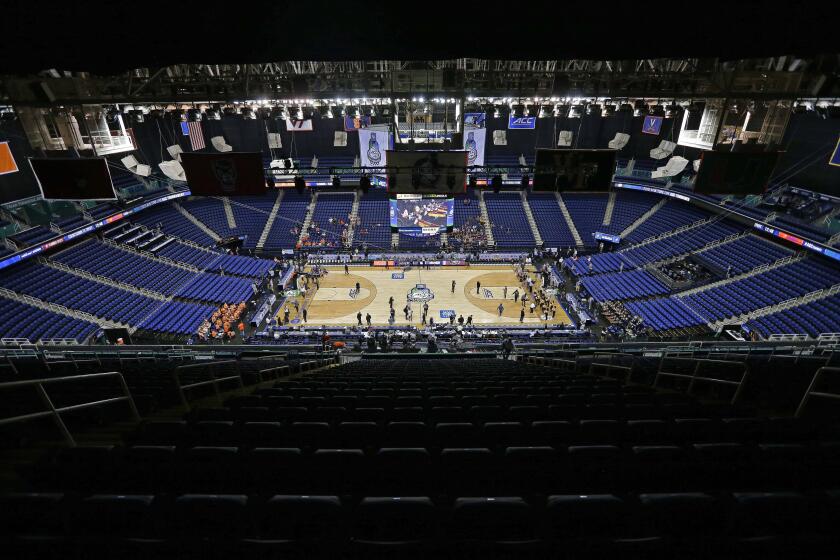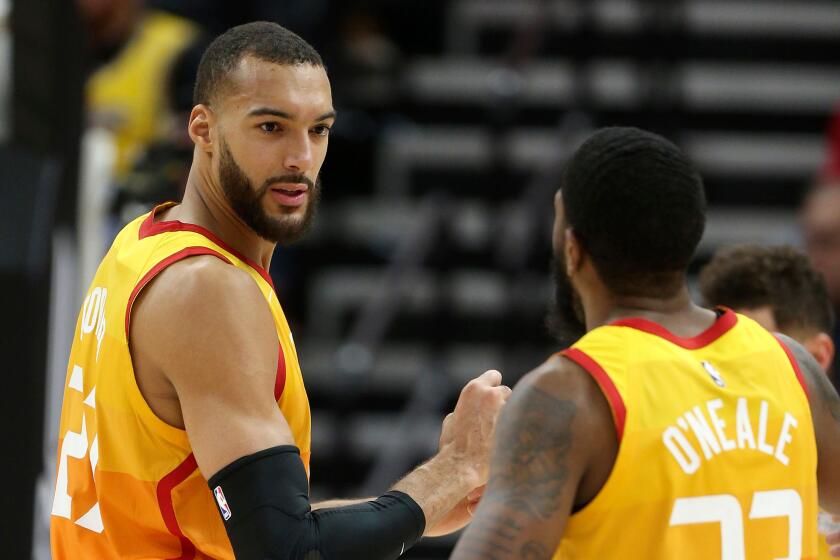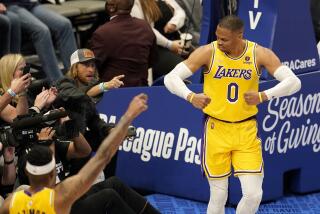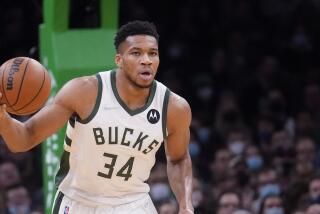
Utah Jazz vs. Oklahoma City Thunder game stopped before tip-off because of a positive coronavirus test.
- Share via
Second in a series of Times Sports stories looking at some of the biggest sports moments and storylines of 2020.
Tipoff between the Utah Jazz and Oklahoma City Thunder had been delayed — no one seemed to know why — but the on-court emcee continued to lead the crowd in chants of “O-K-C! O-K-C!”
The familiar pounding of “Kernkraft 400” by Zombie Nation filled Chesapeake Energy Arena in Oklahoma City on that March night earlier this year. The starting lineups had been introduced. Players waited on the court for the game to begin, then inexplicability headed to the locker rooms. The Thunder’s shaggy mascot, Rumble the Bison, lobbed shots from half court. The Thunder hurriedly summoned singer-songwriter Frankie J, who had been scheduled for halftime, to entertain the crowd as the unexplained delay continued.
“You won’t ever forget this,” a Thunder staffer said in a video of the seconds before the musician took the court.
Sure, the World Health Organization had declared the novel coronavirus outbreak to be a global pandemic earlier that day. The development, however ominous, felt distant, easy to explain away, a life-or-death problem for other parts of the world. For us it was simply an annoyance — the kind of issue that led to health checks for halftime performers and signs around the arena, like others in the NBA, reminding people to wash their hands and not touch their faces — but didn’t change daily life. If pro sports were still being played, could the situation really be that dire?
Thursday will be forever remembered as the day sports went dark, turning off its lights, nailing plywood over its windows, bolting its doors to the insidious approach of the coronavirus.
Then the music ended. Seated courtside, John Leach, the Thunder’s director of events and entertainment, handed a cellphone to public address announcer Mario Nanni.
“Fans,” Nanni said, reading a statement from the phone, “due to unforeseen circumstances, the game tonight has been postponed. You are all safe. Take your time in leaving the arena tonight and do so in an orderly fashion.”
The crowd groaned, murmured in confusion, booed.
“We are all safe,” Nanni said in a calming voice.
Rudy Gobert, the standout Jazz center who made a show of touching the tape recorders and microphones after a news conference two days earlier, had tested positive for COVID-19.
Less than an hour later, the NBA suspended the season. The news came in a two-paragraph statement the league issued in the same hour that President Trump addressed the nation from the Oval Office — “The virus will not have a chance against us” — and Tom Hanks tweeted that he and his wife, Rita Wilson, had fallen ill with COVID-19.
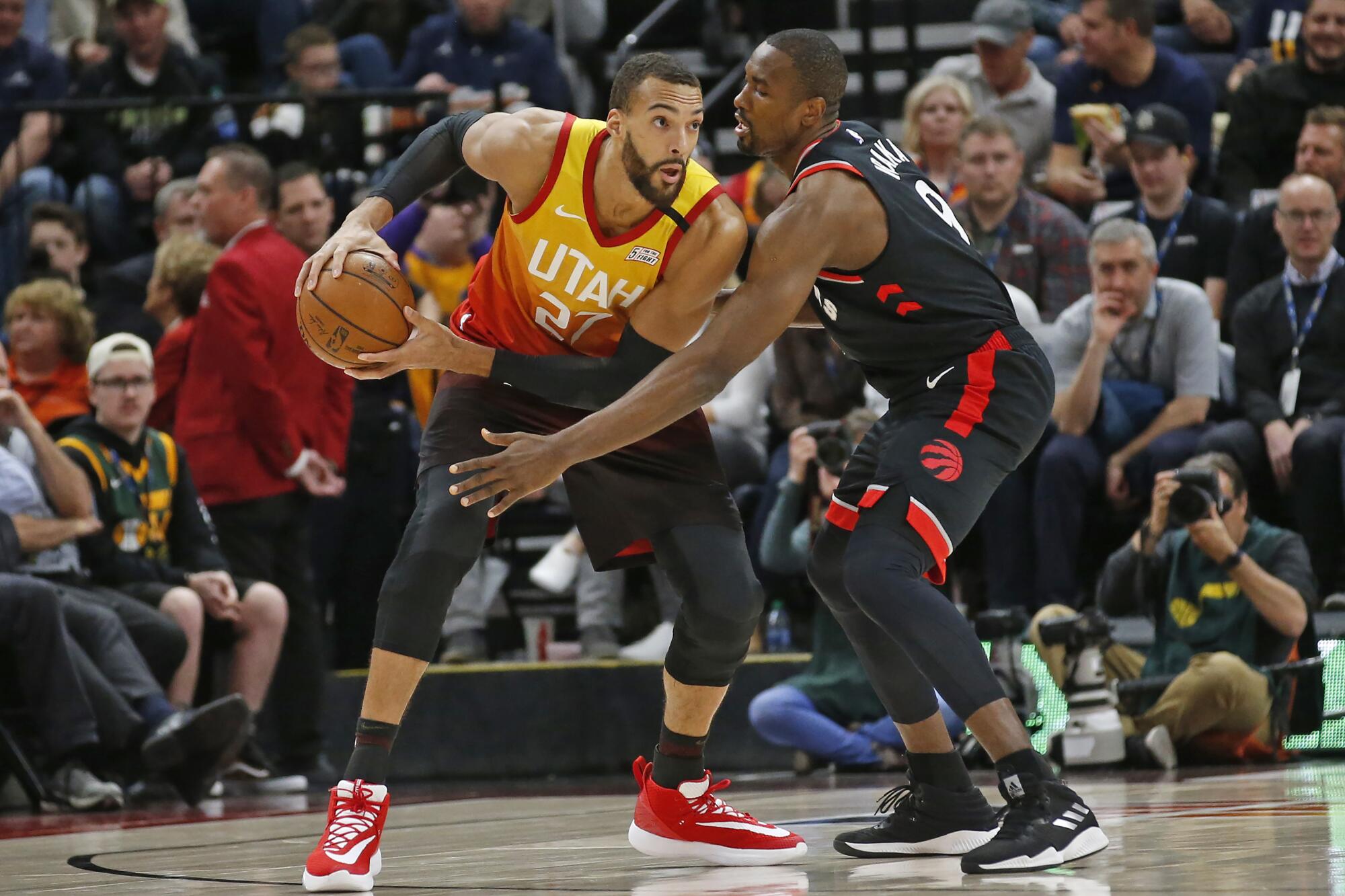
More than a president’s televised words or an actor’s surprise announcement, pro basketball’s sudden halt foreshadowed the disruption we’d soon experience in virtually every area of life. Nanni’s words were the alarm bell. Until that moment, we could escape the creeping worry that a crisis had arrived. It had been easy in the days and weeks before the scene in Oklahoma City to dismiss the virus as an oddity, an inconvenience that would soon pass.
The Year in Review
Yes, grocery shelves had been emptied of toilet paper and bananas and bottled water and pasta and hand sanitizer and canned vegetables. You noticed the odd mask worn by someone while shopping, but that was the exception. We joked about the difficulty in not touching our faces and remembered to wash our hands for 20 seconds by singing “Happy Birthday” twice and some of us transitioned to working from home. We still gathered to worship, enjoyed dinner at restaurants, hugged friends and packed elbow-to-elbow for sporting events.
The games we watch have a long history of weathering wars and natural disasters and civil unrest and economic downturns. Who would be rash enough to predict that competition at every level would just stop? Maybe there would be minor, temporary tweaks because of the virus. But sports vanishing? No way.
Three days before Oklahoma City, more than 23,000 runners wound through Los Angeles for the L.A. Marathon. One bystander held a sign: “Coronavirus cure — run!”
The next day, the four major pro sports leagues — the NBA, NFL, NHL and Major League Baseball — closed their locker rooms and clubhouses to media as a protective measure. The NBA had previously warned teams to use fist bumps instead of high-fives, limit interactions with fans and — this sounded like the worst-case scenario — be ready to play games with only essential personnel present. UCLA and USC took the next step that day and banned fans from competitions for the rest of the month. Conference basketball tournaments did the same thing. The Ivy League even canceled its basketball tournament, drawing ire that turned out to be short-lived.
The NBA on Wednesday moved to suspend the season indefinitely amid the coronavirus pandemic, which included Utah’s Rudy Gobert contracting COVID-19.
New developments arose more quickly than could be digested, a blur of statements and tweets with state and local government edicts that added to a growing sense of unease.
Hours before the Jazz and Thunder were scheduled to meet on March 11, the Golden State Warriors announced their next game at Chase Center wouldn’t have fans. A couple of hours later, the NCAA barred spectators from March Madness games.
L.A. County, the most populous in the U.S., announced its first COVID-19-related death among 28 known cases.

The NBA’s suspension after Gobert’s positive test that night was a demarcation point.
“Man,” Lakers star LeBron James tweeted, “we cancelling sporting events, school, office, work, etc etc. What we really need to cancel is 2020!”
One sport after another stopped play in the following 24 hours until none were left.
Six college conferences canceled their basketball tournaments in a 20-minute span. MLB stopped spring training. The NHL suspended its season. Other pro leagues did the same. Big-name universities stopped athletic competition. The NCAA canceled its tournament for the first time in the event’s 81 years and ended the college basketball season.
Normalcy had been ripped away, replaced by an eerie, foreboding quiet. The Oklahoma City public address announcer told the crowd, “We are all safe,” but those words felt like they belonged to a different time.
Part 3: How the WNBA shaped the national conversation around social justice issues.
More to Read
Go beyond the scoreboard
Get the latest on L.A.'s teams in the daily Sports Report newsletter.
You may occasionally receive promotional content from the Los Angeles Times.
